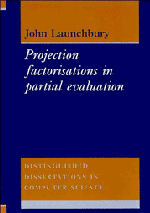
-
Select format
-
- Publisher:
- Cambridge University Press
- Publication date:
- 04 August 2010
- 24 October 1991
- ISBN:
- 9780511569814
- Dimensions:
- Weight & Pages:
- Dimensions:
- Weight & Pages:
You may already have access via personal or institutional login- Series:
- Distinguished Dissertations in Computer Science (1)
Book description
Programming frequently requires that problems are broken down into subproblems and then each subproblem solved independently. These solutions may then be combined to provide a solution to the original problem. Partial evaluation is a serious attempt to tackle this issue, allowing the programmer to write programs in a highly interpretive style without paying the price in efficiency. This thesis covers the theory and practice behind practical evaluation.
Reviews
"...a fascinating blend of a long pragmatic tradition in the art of writing partial evaluators with ML-style polymorphism and a dash of categorical concepts. The writing is exceptionally good and so I recommend this book also as a fine place to learn about partial evaluation." David B. Benson, Mathematical Reviews
Contents
Metrics
Full text views
Full text views help Loading metrics...
Loading metrics...
* Views captured on Cambridge Core between #date#. This data will be updated every 24 hours.
Usage data cannot currently be displayed.
Accessibility standard: Unknown
Why this information is here
This section outlines the accessibility features of this content - including support for screen readers, full keyboard navigation and high-contrast display options. This may not be relevant for you.
Accessibility Information
Accessibility compliance for the PDF of this book is currently unknown and may be updated in the future.


